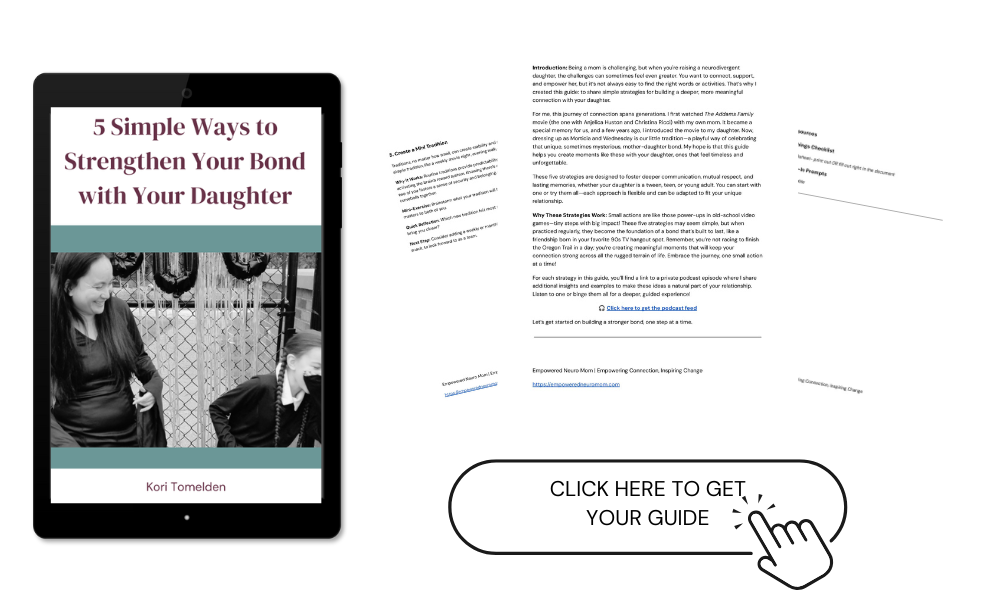As neurodivergent moms, we often face unique barriers that can hold us back in ways others may not fully understand. The path we’re walking isn’t easy, and sometimes it feels like an uphill journey. I’ve been there, held back by self-doubt, expectations, and fears that felt so heavy. Today, I want to share some of the most common obstacles I’ve encountered—and how I’m learning to move past them. If any of these resonate with you, know that you’re not alone, and together, we can create a way forward.
Obstacle 1: Feeling like I have to do it all, perfectly.
There’s an unspoken pressure many of us feel to be the “perfect mom.” For me, this often meant trying to anticipate every need, avoid every meltdown, and somehow juggle it all without letting anyone down. But striving for perfection left me feeling exhausted, overwhelmed, and like I was constantly failing. Over time, I learned that good enough truly is enough. Embracing imperfection has given me space to breathe and allowed me to focus on connecting with my daughter rather than managing every detail.
Obstacle 2: Fear of judgment from others.
Whether it’s the stares in public or unsolicited advice from well-meaning family members, fear of judgment can weigh heavily. For a long time, I let these external pressures shape my actions, even choosing not to go out as much to avoid the uncomfortable glances. But I realized that my fear of judgment was holding both my daughter and me back from fully experiencing life. Gradually, I’m learning to prioritize our needs over others’ opinions. It’s a work in progress, but every time we step out together without worry, it’s a victory.
Obstacle 3: Internalized guilt about taking time for myself.
As moms, we’re often told to put our children first, which sometimes makes self-care feel like an indulgence. For me, taking time to recharge felt selfish, especially when I could be using that time to support my daughter. But I’ve come to understand that taking care of myself isn’t just good for me—it’s essential for my daughter too. When I’m recharged, I’m more present, patient, and able to meet her needs without burning out.
Obstacle 4: Doubting my ability to “get it right.”
Raising a neurodivergent child often comes with many unknowns, and there’s no manual to guide us through every situation. I used to question my every decision, wondering if I was doing the right thing. What I’ve learned is that “right” doesn’t mean perfect—it means doing my best with what I know at the moment. Trusting myself and my instincts has been an ongoing journey, but with each decision, I gain more confidence in my ability to support my daughter in a way that’s true to us.
Obstacle 5: Believing that traditional parenting advice should work.
For years, I tried to follow conventional parenting wisdom, thinking it would somehow fit our family. But neurodivergent parenting often requires a different approach, one that prioritizes flexibility, empathy, and understanding over rigid structure. Letting go of these conventional expectations has been freeing and allowed me to embrace strategies that genuinely support my daughter’s unique needs. It’s okay to create your own parenting path, one that honors who you both are.
Obstacle 6: Navigating hyperfocus and special interests.
Hyperfocus and special interests can be both a blessing and a challenge for neurodivergent moms. On one hand, hyperfocus allows us to pour incredible energy and attention into things that matter to us. But it can also make balancing responsibilities feel overwhelming when we lose track of time or struggle to transition to other tasks. For me, this often meant neglecting essential self-care or housework when I got deeply absorbed in a project or interest. Over time, I’ve learned to set gentle boundaries for myself—creating time blocks or alarms to remind me to step away and shift focus.
Special interests, too, have been a source of both connection and guilt. I’ve found joy in sharing my passions with my daughter, allowing us to bond over things like crafting, gaming, or even researching topics we’re both curious about. But I’ve also struggled with feeling like indulging in my interests took away from being a “good mom.” What I’ve come to realize is that embracing my special interests isn’t just a form of self-expression—it’s a way to model authenticity for my daughter. When she sees me passionate and engaged, it shows her that her own interests are valid and worth pursuing. Together, we’re learning to celebrate the things that light us up and create space for our unique ways of engaging with the world.
If any of these challenges feel familiar, remember that you’re not alone on this journey. Moving past these obstacles takes time and self-compassion. You don’t have to be perfect, and it’s okay to create a version of motherhood that fits you and your daughter.
To help you navigate this path with more ease, I’ve created a free guide, 5 Simple Ways to Strengthen Your Bond with Your Daughter. It’s filled with practical, connection-based strategies that meet you both where you’re at, without the pressure to do it all. Sometimes, just a small shift in perspective or a simple daily action can make a big difference. You deserve tools that support both you and your daughter, helping you grow together.



Comments